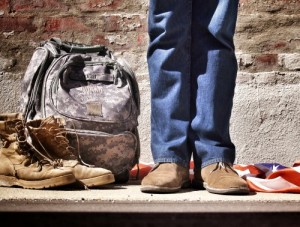5 Unexpected Lessons I Learned from the U.S. Army
This week, I had the pleasure of attending the 39th annual George C. Marshall Leadership Conference in Fort Leavenworth, Kansas. This conference brought together Army Reserve Officers’ Training Corps (ROTC) cadets from universities across the United States for training in military history, diversity, and leadership. As a community partner invited to engage with the cadets in the area of science, technology, engineering, and mathematics (STEM) education and to co-facilitate multi-hour classroom sessions over the course of two days, I learned valuable insights about the Army and its practices and identified several lessons that can be transferred to other professional communities.

(1) You are expected to look out for the soldier to your right and to your left.
Many of the cadets referred to their love of the military, their family’s lineage of military service, and their commitment to protecting their families. The phrase that resonated most with me, however, was one’s commitment to the soldier to the left and to the right. While in many higher education circles, day one begins by telling students that everyone won’t make it to graduation, the Army tells its leaders that it is an expectation that all of their soldiers reach their goals together and that together they rise and fall.
(2) Standards are explicit.
Protocols are documented explicitly in the Army, which celebrates its 242nd anniversary this year, thereby making it older than the United States. Even hairstyles are regulatory! How phenomenal it must be to enter an organization that boasts generations of members and contains time-tested documents that are available to its members. Nonmilitary organizations often experience hiccups, because they don’t have policies and processes in place. One caveat is that organizations with such tried and true standards must remain open to potential additions to current practices.
(3) Scalability is mandatory.
One of the biggest concerns of the Army is scalability. This means that instead of engaging in activities that impact individuals or small groups of people, the Army must identify ways to scale its practices, especially given its focus on standards, uniformity, and efficiency. For example, the Army recruits 10,000 cadets a month. This means that everything- training, recruitment, etc., has to occur at scale. There is no time for one-on-one practices that don’t produce results, and before anything is implemented leaders must think of the bigger picture and how new initiatives affect everyone.
(4) Being one-dimensional is not an option.
Surprisingly, the Army is more than what a civilian (note my Army talk!) thinks it is. They don’t just focus on push-ups and military drills. They emphasize reading, lifelong learning, mental preparation, and professional development in areas such as leadership. They recognize that in a changing world, they must change also and must demonstrate proficiency in numerous areas, especially if they are in the heat of battle and have to replace a fallen comrade quickly. Members of the Army are living, breathing people who are engineers, political scientists, helicopter pilots, and much more. We should strive to be as diverse in our own lives.
(5)Feedback is constructive even when it is rough.
Generals and leaders are sharp with their comments. They publicly call out cadets for their discrepancies so that later in their careers, lives can be saved. Every moment is a teachable moment. Training occurs every day in every way. This is expected and practiced.
In summary, although I had numerous stereotypes about the military prior to attending this conference, I realize that the tough love of the Army is necessary to ensure that lives are saved and that our country remains safe. Excellence is a key to success, and I think that civilians have much to learn from the military.
———-
If you enjoyed my post, feel free to share it with others. Also check out my other blog posts, and provide your contact information so that we can stay connected. Follow me on Twitter, Instagram, and Pinterest @monicafcox.
